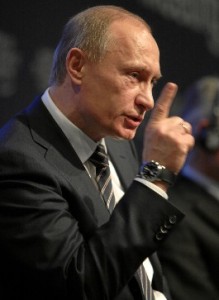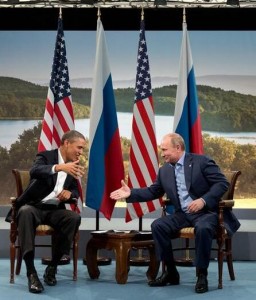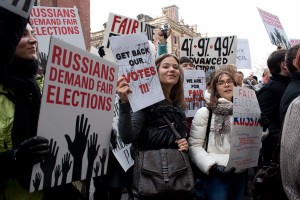 courtesy of flickr user: Eugene Yurevich
courtesy of flickr user: Eugene Yurevich
Putin’s Decisive Victory in the 2016 Duma Elections
On Sunday, Russians headed to the polls to vote on their Duma (Parliament) representation. The ruling United Russia party, backed by President Vladimir Putin won a crushing victory, gaining 54% of the vote, up from 49% in the previous Duma elections of 2011. United Russia secured a supermajority, with 343 of 450 seats. The other parties to secure list representation by passing the 5% threshold were the Kremlin sanctioned opposition parties; the Communist Party (13%), the Liberal Democratic Party of Russia (LDPR) (13%), and A Just Russia (6%). The two main Western leaning opposition parties Yabloko (2%) and Parnas (0.7%) failed to gain list or single-member district seats.
Despite this seemingly resounding win for Vladimir Putin, the 2016 Duma elections were somewhat of a mixed bag. While nowhere near as damaging as the fiasco of the 2011 elections, where widespread belief that Putin stole the election brought tens of thousands of protesters to the streets, the 2016 election was marred by low voter turnout (47.8%), allegations of fraud, and general cynicism with some people mocking voting for popular fictional characters, such as the Pokemon Pikachu. Western observers have criticized the election for involving the disputed region of Crimea and the OSCE said that while more transparent than previous elections, these elections still had systemic shortcomings, such as legal restrictions, procedural irregularities, and state control of the media.
PUTIN FIRMLY IN CONTROL
How the Duma operates is expected to change very little. Even when United Russia did not hold a supermajority, the Duma regularly acted as a rubber stamp for the Kremlin. However, the increase in voter share can be seen as affirmation for Vladimir Putin by the Russian people. Putin himself seems to think so, calling the landslide victory proof of citizens’ trust for his government’s response to external pressure such as sanctions.
 If Putin does see the results as a vote of confidence in his personal rule, they give him the ability to act on it. While Putin says it is too early to know if he will run in the presidential elections in 2018, the encouraging election results certainly give him numbers to point to as a reason to do so. Additionally, with his party in a supermajority, Putin has the ability to achieve legislation or change the Constitution to increase his control further. This ability to change the Constitution is critical, as if Putin indeed is reelected in 2018 for another six year term, he would be term-limited out of office in 2024 and unable to run again until 2030, at which point he would be 78 years old.
If Putin does see the results as a vote of confidence in his personal rule, they give him the ability to act on it. While Putin says it is too early to know if he will run in the presidential elections in 2018, the encouraging election results certainly give him numbers to point to as a reason to do so. Additionally, with his party in a supermajority, Putin has the ability to achieve legislation or change the Constitution to increase his control further. This ability to change the Constitution is critical, as if Putin indeed is reelected in 2018 for another six year term, he would be term-limited out of office in 2024 and unable to run again until 2030, at which point he would be 78 years old.
While not strategically important, the only liberal Duma member, Dmitri Gudkov, was defeated. While this was expected, it is a huge loss for the opposition in Russia. Some hoped that with half of the Duma elected directly within districts, liberal opposition would have a chance to pick up a few seats. Instead, support for liberal opposition fell due to internal rivalries, state oppression, and voter apathy. The three single-member districts not won by one of the four favored parties were won by right-wingers and nationalists.
IMPLICATIONS FOR THE U.S.
Putin hoped that the election would be viewed by the world as a fair and transparent election. However, few Western governments regarded the election as legitimate. In addition to persistent allegations of fraud and strict government control of the media, the voting in Crimea, which Russia seized from Ukraine in 2014, is seen as problematic.
 Being overly critical of the election is not in U.S. interests. The 2016 Duma elections are neither the time nor the pace for the United States to take a stand on supporting democracy abroad. In today’s tense climate and as the U.S. seeks to work with Russia in Syria another point of contention between the two nations is not advisable. While the U.S. can, and should, criticize Russia for holding elections in Crimea, bringing Russia to task over election fraud would be counterproductive.
Being overly critical of the election is not in U.S. interests. The 2016 Duma elections are neither the time nor the pace for the United States to take a stand on supporting democracy abroad. In today’s tense climate and as the U.S. seeks to work with Russia in Syria another point of contention between the two nations is not advisable. While the U.S. can, and should, criticize Russia for holding elections in Crimea, bringing Russia to task over election fraud would be counterproductive.
Putin is by no means an ideal U.S. partner. However, with Russia’s economic downturn, it is possible that Putin could face an internal challenge from another would-be autocrat. This would not be in U.S. interests. While democratic regime change would not be a problem, another autocrat challenging Putin for power would just lead to instability and uncertainty. In a time where the United States is trying to work with Russia in many areas, instability would be catastrophic. United Russia’s runaway victory, combined with Putin’s jettisoning of senior advisors, makes this scenario highly unlikely. For better or for worse, the United States is stuck with the devil that it knows.






